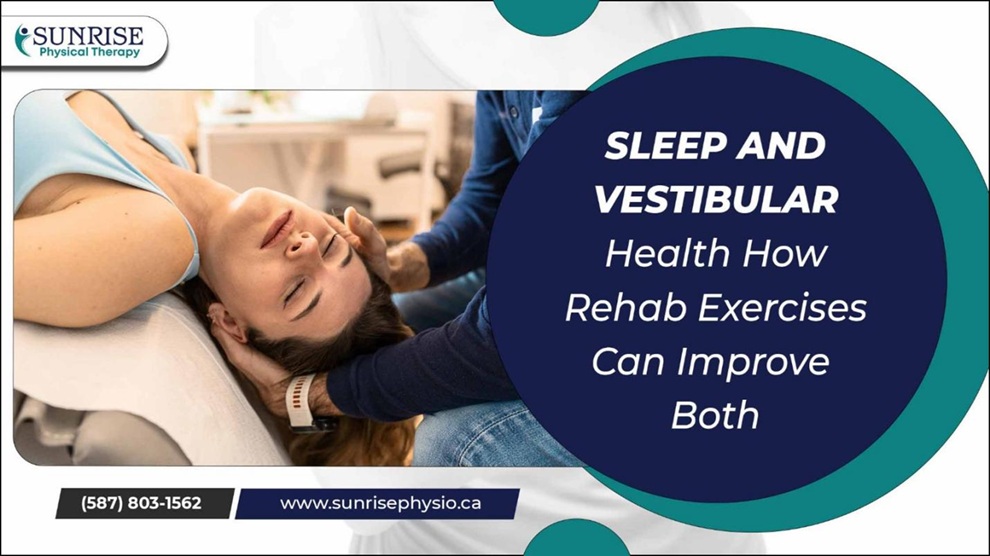
Sleep and Vestibular Health—How Rehab Exercises Can Improve Both
Picture attempting to sleep on a merry-go-round that never ends—that’s what it’s like for a person with vestibular dysfunction. Dizziness, imbalance, and vertigo don’t take a break at bedtime, leaving behind sleepless nights and a cloudy brain. Vestibular Rehabilitation Therapy (VRT) addresses dizziness and balance problems and improves sleep. For individuals looking to regain balance and rest, Vestibular Physiotherapy in Spruce Grove is a life-altering solution that allows people to regain their sleep and stability.
Sleepless Nights and Spinning Days: Why Vestibular Health Affects Sleep Quality
Balance is not simply standing up straight—it’s intimately connected with the brain’s sensory systems. When vestibular impairment disrupts equilibrium, the nervous system frantically tries to readjust. This increased alertness can cause the brain to have difficulty unwinding at night.
Vestibular disorders such as vertigo, motion sickness, and imbalance can lead to:
- Misfiring balance signals that confuse the brain
- Increased stress hormones and altered circadian rhythms
- A hypervigilant state at rest
In short, when the world will not stop revolving, neither does the mind.
Sleep Disruption Symptoms Common in Vestibular Disorders
- Difficulty falling asleep
- Nighttime dizziness or vertigo at night
- Anxiety linked to dizzy episodes
- Persistent fatigue from poor sleep
Reset and Recharge: How Vestibular Rehab Exercises Support Sleep and Stability
Vestibular rehabilitation draws on the brain’s remarkable capacity to remap itself. With repetitive, directed exercises, the brain adapts to:
- Filter and adjust to abnormal vestibular signals
- Enhance balance, decreasing disorientation and anxiety
- Create a less agitated, more stable inner environment that fosters sleep
Neuroplasticity: The Brain Learns to Adapt
Vestibular rehabilitation therapy (VRT) is based on the theory of neuroplasticity—the brain’s capacity to create new neural connections due to repeated stimulation. In people with vestibular dysfunction, this translates to the brain learning to adapt gradually to make up for unbalanced signals from the inner ear. With regular exercise, patients typically experience less dizziness, better coordination, and improved sleep. After the brain no longer struggles to stabilize equilibrium, the nervous system can convert to a tranquil, restorative state—just what the sleep recovery process is looking for.
Movement-Based Regulation of the Sleep Cycle
Physical activity assists with normalizing circadian rhythms, and vestibular rehabilitation exercises are no different. Eye, head, and body coordination activities like gaze stabilization or habituation drills retrain balance mechanisms and induce physical relaxation. When dizziness subsides and everyday functions become easier, anxiety related to motion sickness also subsides. This emotional comfort helps facilitate more regular, unbroken sleep.
Reducing Nighttime Triggers
Most vestibular disorders, such as Benign Paroxysmal Positional Vertigo (BPPV), are exacerbated by head movement, particularly when in bed. Specific exercises like the Epley maneuver relocate calcium crystals in the inner ear and can successfully prevent episodes of nighttime vertigo. This translates to fewer sleep disturbances and less anxiety at bedtime.
By going through a formal rehab regimen, patients can access more than enhanced physical equilibrium—peace of mind and the ability to sleep. For recovering from BPPV, post-concussion syndrome, or chronic dizziness, vestibular rehab provides a way toward improved sleep and daily stability.
Balance Training by Design: Physiotherapy Techniques That Reboot Balance and Rest
Vestibular Physiotherapy in Spruce Grove identifies the root of dizziness, motion sensitivity, and sleep disruptions, offering personalized care with sleep-friendly adjustments to reduce bedtime overstimulation.
Gaze Stabilization Exercises
These exercises retrain the eyes to keep steady vision when the head moves. This assists in recalibrating visual focus, especially in low light or when horizontal, and decreases the chances of nighttime dizziness and disorientation.
Canalith Repositioning
Especially created for treating BPPV (Benign Paroxysmal Positional Vertigo), this method restores dislodged inner ear crystals to their correct position. Repairing balance signals to the brain tends to remove turning in bed and lying flat vertigo.
Habituation Exercises
These exercises reduce sensitivity over time by continuously exposing the brain to motion-evoking stimuli. They minimize dizziness during day-to-day and nighttime movement and encourage a sense of relaxation leading up to bed.
Balance Training
Increases coordination and lessens the risk of falls. Strengthening bodily confidence may put anxiety before sleep at bay, particularly in patients concerned with nighttime waking and rising.
Postural Training & Relaxation Techniques
It alleviates spinal and muscle tensions, creating optimal sleeping posture and reducing nervous system excitement.
Habits That Heal: Lifestyle Support to Boost Sleep Recovery
Mixing good sleep hygiene with vestibular-centred routines makes for a potent recovery combination. Habits to consider include:
- Having the sleeping area cool and dark
- Restricting screen time and caffeine at night
- Adding vestibular rehab exercises to a wind-down practice
Mental Health & Sleep
Vestibular dysfunction is usually accompanied by anxiety and depression, which interfere with sleep. One can soothe the nervous system and enhance healthier sleep patterns by including mindfulness, soft rehab, and nighttime routines.
When to Seek Help—Is It More Than Just Poor Sleep?
Persistent dizziness or discomfort upon waking may indicate a vestibular disorder, not just poor sleep. These issues often arise subtly in the morning or after sudden movements. The following symptoms may indicate a vestibular condition that requires professional attention:
- Dizziness upon waking
- Sensitivity to quick or jerky movements
- Nausea, visual disturbances, or foggy thinking
- Past head injuries, concussions, or episodes of BPPV
These symptoms often indicate vestibular issues that impact balance and overall well-being. If these issues consistently disrupt daily life or sleep, it’s important to consult a professional for proper care.
Rest Better with a Balanced Body and Brain
When vestibular dysfunction disrupts the inner balance, sleep becomes a nightly struggle. However, with targeted rehab exercises, stability, and quality rest, they can return to the rhythm of life. For those searching for deeper sleep and steadier steps, Sunrise Physical Therapy provides focused care to help restore balance and improve sleep health. Vestibular Physiotherapy in Spruce Grove is designed to help individuals regain control over their balance and nightly rest.
Ready to restore the balance and sleep? Book the consultation and start the path to better health today.



